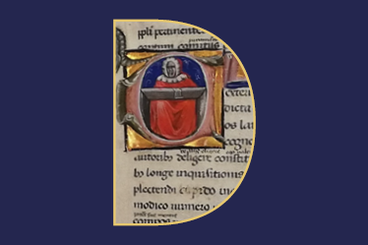- Home
- THE CENTER Apri sottomenù
- RESEARCH Apri sottomenù
- PUBLICATIONS Apri sottomenù
-
EVENTS
Apri sottomenù
- Lucretia Estensis de Borgia. Tra biografia e narrazione nelle carte dell'Archivio di Stato di Modena
- Libri e lettori nella Bologna dei papi (1506-1796)
- Pagine benedettine
- Dante e la Divina Commedia in Emilia-Romagna
- Con ogni diligenza corretto e stampato. Stampatori, librai e cartari a Faenza dal XV al XVIII secolo
- The Seasons of Scholarship and the Generations of Scholars. A European History (15th-19th Centuries)
- BIBLIOGRAPHIC RESOURCES Apri sottomenù
- AGENDA
- Contacts
- Photogallery
Dall'Alma Mater al mondo. Dante all'Università di Bologna
An exhibition organized that tells the close, deep and ancient relationship between the Supreme Poet and the University of Bologna to celebrate the seven hundredth anniversary of the death of Dante Alighieri (1321-2021)

-
Date:
23 OCTOBER-17 DECEMBER 2021from 17:00 to 16:00 -
Event location: University Library, Aula Magna, via Zamboni 35, 40126 Bologna, Italia || Anticamera dell'Aula Carducci, via Zamboni 33, 40126 Bologna, Italia
-
Type: Exhibitions
«The relationship between Dante and the University of Bologna is a close, deep and ancient relationship, which has its roots in Dante's biography itself and then in the very first reception of his works. The traces of the poet's presence in the city are numerous and date back to the first attestation of one of his works, the sonnet of the Garisenda, transcribed in 1287 on a page of the Bolognesi Memoriali by the notary Enrichetto delle Querce. Moreover, the profound knowledge of the city is testified in the first years of exile by De vulgari eloquentia, which deploys references to a philosophical-linguistic culture of a university slant and above all shows a very keen attention to Bolognese linguistic phenomena, not to mention the space that the poets of the city of Bologna have in this work, and not only the always exalted Guinizzelli. In the Comedy the presence of Bologna is more complex and controversial: among the many cities criticized by the poet for their vices, Bologna is certainly no exception and is indeed hit with particular violence on the occasion of the encounters with the damned Bolognese, such as Venedico Caccianemico, damned fra the ruffians (Inf. XVIII, 40-63), and the joyful friars Loderingo and Catalano, in the pit of the hypocrites (Inf. XXIII, 103-144). But also an illustrious professor of the Studium is mentioned: Francesco d’Accursio (Inf. XV, 110), professor of law at the University of Bologna and son of the famous Accursio, is listed among the sodomites, violent against nature. His condemnation, however, does not seem to involve the city, but rather proves the fact that among the sodomites there are "great and well-known literati" (Inf. XV, 107). The relationship with Bologna continues to the end. It is therefore no coincidence that even the first diffusion of the Comedy, after the poet's death, has Bologna as its epicenter and that Bolognese culture is also at the forefront in the work of exegesis. On the strength of such an important and ancient relationship with Dante, the University of Bologna has built over the last one hundred and fifty years a very high tradition of Dante's studies which has offered a multiple and decisive contribution to the development of modern Dante philology and criticism but also to the reception artistic, scholastic and popular of Dante and his works».
(Source: Giuseppe Ledda, Introduction to the exhibition catalog)
The exhibition is organized by:
• BUB - University Library of Bologna
• DA - Department of Architecture
• DBC - Department of Cultural Heritage
• FICLIT - Department of Classical and Italian Philology
• LILEC - Department of Modern Languages, Literatures and Cultures
• DISCI - Department of History Culture Civilization
• SMA - University Museum System
OPENING:
Saturday, 23rd October, 5 pm
Aula Magna of the University Library of Bologna (via Zamboni 35, Bologna)
Contacts
University Library of Bologna
Via Zamboni, 33/35, 40126 Bologna
+39 051 2088306
Opening time:
The main body of the exhibition itinerary set up in the Aula Magna BUB (via Zamboni 35) can be visited free of charge and by reservation from Monday to Friday from 10:00 am to 4:00 pm and on Saturdays from 10:00 am to 1:00 pm.
The piece of the itinerary located in the anteroom of the Aula Carducci (via Zamboni 33) can be visited free of charge and by reservation from Monday to Friday from 10:00 am to 4:00 pm.
Guided tour booking: https://eventi.unibo.it/prenotazioni-bub
Guided tour bookings for schools: send an email to bub.tours@unibo.it
University Library of Bologna
Aula Magna of the University Library of Bologna (via Zamboni 35) e Anticamera dell’Aula Carducci (via Zamboni 33) - Bologna